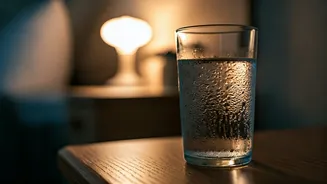Dehydration's Grip
Dehydration is a primary reason why you might wake with a dry throat. During sleep, our bodies continue to lose fluids through breathing and sweating.
If you haven't consumed enough water during the day, your body will be short on fluids while you sleep. This deficiency leads to a reduction in saliva production, leading to the throat becoming dry. This effect can be worsened by conditions like a stuffy nose, which forces you to breathe through your mouth. Counteracting this requires mindful hydration throughout the day, particularly before bed. Keep a glass of water near your bed to sip on if you wake up with a parched throat, quickly replenishing essential fluids.
Mouth Breathing's Role
Mouth breathing is another major culprit behind morning throat dryness. When nasal passages are blocked, whether by allergies, colds, or sinus infections, the body naturally resorts to mouth breathing to draw air. Breathing through the mouth bypasses the natural humidifying process of the nasal passages. This directly exposes the throat tissues to dry air, leading to dehydration and resulting in a dry, uncomfortable feeling. This can be especially prominent in people who snore or suffer from sleep apnea, wherein mouth breathing is common. Solutions include addressing the underlying nasal issues, and employing methods like using nasal strips or humidifiers to keep the environment moist.
Sleep Apnea Connection
Sleep apnea, a disorder characterized by interrupted breathing during sleep, frequently contributes to waking up with a dry throat. People with sleep apnea often breathe through their mouths due to airway obstructions, creating the perfect conditions for throat dryness. The periods of interrupted breathing can also exacerbate the dryness, as the body struggles to maintain proper hydration levels throughout the night. Treatment for sleep apnea, like CPAP machines or oral appliances, not only helps improve breathing but can also reduce the frequency of dry throats. Consulting with a doctor to diagnose and effectively manage sleep apnea is a crucial step for relief.
Room Humidity Impact
The humidity level in your bedroom plays a considerable role in throat dryness. Dry air extracts moisture from your throat and mouth tissues, thereby leading to dryness. This effect becomes especially noticeable during colder months when heaters dry the air further. Using a humidifier can significantly combat this by adding moisture back into the air, thus preventing throat dryness. Place the humidifier near your bed and maintain humidity levels between 30% and 50% for optimal comfort. Regularly cleaning your humidifier is essential to prevent mold growth and ensure it works effectively, contributing to a healthier sleeping environment and reducing morning discomfort.
Acid Reflux Issues
Gastroesophageal Reflux Disease (GERD) or acid reflux can also result in throat dryness. Stomach acid can travel up the esophagus and irritate the throat lining during sleep, leading to discomfort and dryness. This condition is more likely to cause dryness if you're sleeping on your back. If the stomach acid reaches your throat, it can cause the feeling of burning and dryness. To prevent this, try elevating your head with extra pillows while sleeping and avoid eating large meals before bed. Certain lifestyle adjustments, such as avoiding triggers like spicy food, alcohol, and caffeine before bedtime, can drastically help reduce acid reflux symptoms. If the symptoms persist, consult with a doctor to discuss treatment options.
Medication Side Effects
Certain medications are known for causing dry mouth, and subsequently, a dry throat. These include antihistamines, decongestants, antidepressants, and blood pressure medications. These drugs reduce saliva production, which can cause the mouth and throat to feel dry, particularly overnight. If you suspect your medication is the cause, speak to your doctor about possible alternatives or strategies to combat dryness. Staying hydrated and practicing good oral hygiene may help mitigate some of the effects. In cases where there's no substitute medication available, your doctor may suggest artificial saliva products or other remedies to keep your throat moist and comfortable throughout the night and in the morning.












